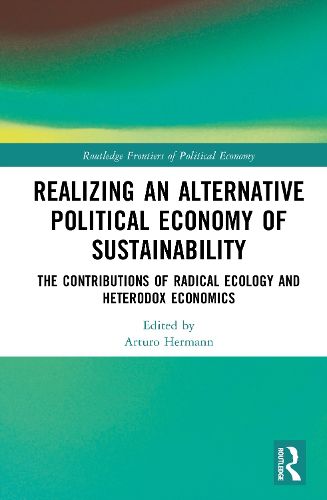Readings Newsletter
Become a Readings Member to make your shopping experience even easier.
Sign in or sign up for free!
You’re not far away from qualifying for FREE standard shipping within Australia
You’ve qualified for FREE standard shipping within Australia
The cart is loading…






Engagement with and between a plurality of progressive, non-neoclassical traditions is an important step in fostering a more capacious understanding of sustainability - both as a concept and as a political objective. To that end, this book provides a critical overview of the development of alternative perspectives on the economics of sustainability, highlighting the presence of various strands of heterodox economics and radical ecology, and arguing that greater engagement between these schools of thought is required to help formulate viable alternatives to the prevailing neoliberal ideology.
The chapters in Part One of this volume "Ecofeminism, Social Ecological Economics, Bioeconomy, Steady State" present a series of concrete policy proposals for building socially-just, sustainable socio-economic processes. Each chapter utilizes the acumen of a given heterodox tradition to formulate policy reforms to secure this objective. In Part Two "Heterodox Macroeconomics and Sustainability" the contributors make the case for more radical forms of socio-economic transformation, particularly emphasizing community, local and regional level initiatives for change. The final part "Circular Economy, Civil Economy and Other Heterodox Contributions" reflects on the potential strategic political-economic contribution of heterodox economics to building more sustainable and just socio-economic practices in a broader sense. These chapters demonstrate that heterodox economics and radical ecology can productively contribute to realizing sustainability in areas such as economic pedagogy, through working in conjunction with other social justice movements, and by challenging extant neoliberal ideologies of sustainability. They also deliberate on some of the institutional and epistemological challenges that confront heterodox practitioners seeking to make such an impact.
This volume is essential reading for anyone concerned with a viable alternative conception of the economy and sustainability, including readers from all schools of heterodox economics and radical ecology, and people and organizations involved in various ways in building an alternative political economy of sustainability.
$9.00 standard shipping within Australia
FREE standard shipping within Australia for orders over $100.00
Express & International shipping calculated at checkout
Engagement with and between a plurality of progressive, non-neoclassical traditions is an important step in fostering a more capacious understanding of sustainability - both as a concept and as a political objective. To that end, this book provides a critical overview of the development of alternative perspectives on the economics of sustainability, highlighting the presence of various strands of heterodox economics and radical ecology, and arguing that greater engagement between these schools of thought is required to help formulate viable alternatives to the prevailing neoliberal ideology.
The chapters in Part One of this volume "Ecofeminism, Social Ecological Economics, Bioeconomy, Steady State" present a series of concrete policy proposals for building socially-just, sustainable socio-economic processes. Each chapter utilizes the acumen of a given heterodox tradition to formulate policy reforms to secure this objective. In Part Two "Heterodox Macroeconomics and Sustainability" the contributors make the case for more radical forms of socio-economic transformation, particularly emphasizing community, local and regional level initiatives for change. The final part "Circular Economy, Civil Economy and Other Heterodox Contributions" reflects on the potential strategic political-economic contribution of heterodox economics to building more sustainable and just socio-economic practices in a broader sense. These chapters demonstrate that heterodox economics and radical ecology can productively contribute to realizing sustainability in areas such as economic pedagogy, through working in conjunction with other social justice movements, and by challenging extant neoliberal ideologies of sustainability. They also deliberate on some of the institutional and epistemological challenges that confront heterodox practitioners seeking to make such an impact.
This volume is essential reading for anyone concerned with a viable alternative conception of the economy and sustainability, including readers from all schools of heterodox economics and radical ecology, and people and organizations involved in various ways in building an alternative political economy of sustainability.